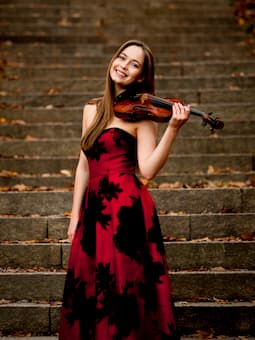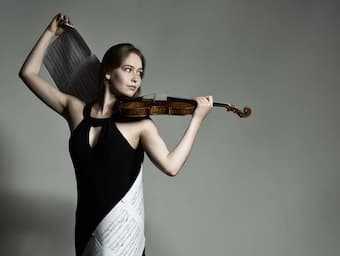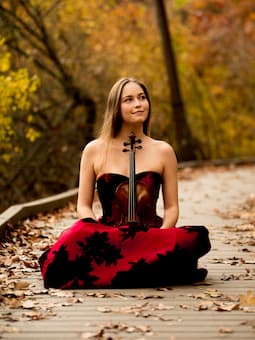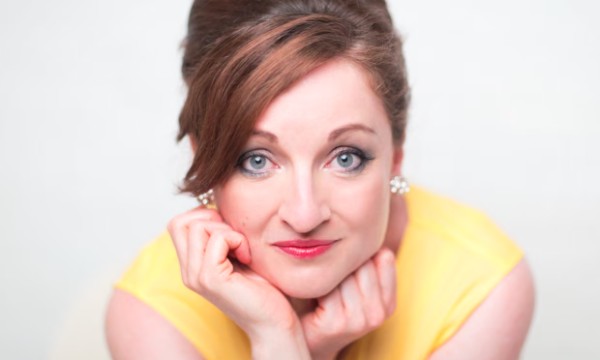
Geneva Lewis © genevalewisviolinist.com
Originally from Auckland, young violinist Geneva Lewis has already performed extensively throughout Europe and the USA. As a member of the Callisto Trio, she has played at Amsterdam’s Concertgebouw, and her solo work has seen her perform with orchestras including Symphony NH, the Brentwood Westwood and Diablo Symphony Orchestras, and the Pasadena Pops. Geneva was awarded a 2021 Avery Fisher Career Grant, and is currently studying the Artist Diploma programme at the New England Conservatory in Boston under Miriam Fried.
Lili Boulanger: Nocturne (Geneva Lewis, violin; Sahun Sam Hong, piano)
What inspired you to take up the violin?
I have two older siblings, and my brother also played violin. He was a fantastic violinist, and I was growing up really looking up to him and wanting to be just like him, which definitely inspired me to stick with the violin.

© Donald van Hasselt
What inspired you to become a professional?
I had a teacher in L.A. at the Colburn School called Aimée Kreston who was like a second mother to me – and still is! – and she is probably the person who really inspired me to want to be a violinist, and have it be a profession.
Aimée encouraged a lot of chamber music very early on. I was playing chamber music since I was 8 or 9, and I really loved that. Chamber music has been one of my great loves for most of my life now, and something that still brings me so much joy. That’s been a huge inspiration and continues to be for me.
Who inspires you now?
So many people! Chronologically around the same time as Amy I had a chamber coach at the Pasadena Conservatory called Andrew Cook who really cultivated that love of chamber music. He was very demanding in a very positive way. He always really challenged us and expected a lot of us. He wasn’t afraid to tell us when we weren’t living up to the standards he knew we were capable of, and was unbelievably supportive. Andrew gave us such a respect for the music, knowing to give the music everything we could to justify playing it at all.
Also, my current teacher, Miriam Fried, has absolutely changed my life since I started studying with her five years ago. She’s been everything to me.
Poulenc: Sonate pour violon et piano, FP 119 (Geneva Lewis, violin; Dina Vainshtein, piano)
Which composer[s] do you feel the most comfortable with?
I tend to really love whatever I’m working on, and just try to really become immersed in and connected to everything I’m playing. Obviously there are some things that feel more natural to get a connection [to] than others, but I’m not sure I’d be able to name the same thing where I think, ‘Oh I’m really good at this!’
In terms of favourites, I’ve always felt deeply moved by Brahms, Beethoven, and Schubert. [They] would be up there for sure, but they’re kind of terrible answers to your question because Beethoven and Schubert in particular I find so difficult and often uncomfortable to play, although it’s the most perfect music to me.

© genevalewisviolinist.com
Is there any repertoire you haven’t performed yet that you would like to in the future?
I’m very excited to perform the Brahms violin concerto which I haven’t done but am scheduled to play next spring. I’m super excited for [that] because I have this amazing violin on loan from the New England Conservatory, as part of the Artist Diploma programme. It’s the Joachim-Ma Strad, so it was played by Joachim and very possibly it’s the violin that the Brahms concerto was premiered on, which is absolutely insane to think about. I just adore the concerto and the chance to play it on this violin that has such a history with it is pretty mind-blowing.
Is there a particular composer / piece that you’ve really felt your relationship will change with over time (for better or worse)?
I’m not sure Brahms has changed for me in a particularly profound way, it’s just I have always loved that piece for what feels like my whole life. Obviously you discover many new things about music as you become closer to it, but as far as changing, I’m not sure.
Maybe I haven’t lived long enough or revisited many pieces enough for them to have grown with me, but there are pieces where I relate them to my own life, to when I played it, what I was going through at the time, the people I shared it with, things like that that bring me different connections to the piece as I insert whatever I’m going through naturally into the music.
Do you find inspiration from things other than music?
I really love dance. I used to take ballet when I was little – I wasn’t particularly good, but I find so much movement inherently in music. Obviously they’re so closely connected anyway, and of course I feel the connection of dance requiring music as very obvious.
I find often when I’m playing music I have a very visual element to it. I see the contour of the music quite literally and often will have some form of very vague dance movements as I play it in my mind. Dance has always been a great love, for sure.
For more of the best in classical music, sign up to our E-Newsletter
Telemann: Fantasia No. 7 in E flat major (Geneva Lewis)





Hi Geneva,
I play and study at the moment the nocturne of Boulanger, your interpretation is very beautiful.
I see this piece as a walk in a starry night the stars are in the piano in the beginning and the long notes in the violin part are the shining . After the chromatic passages to the sky (fireworks) we meet a variete orchestre.( ff)
Then we walk we go further in a peaceful night which reminds us of
Ravels sonatine in the solo piano before we listen two to bars of
Debussy. The piece is a beauty in the piano and also in the violin part : exquisite and I noticed you must as a violinist listen very carefully to the piano then it becomes magical.
I like to hear from you what you think of these analyses,
greetings Marinus The Netherlands
Dear Geneva
Your sensitive interpretation of Brahms Sonata in D yesterday at the Holywell in Oxford brought tears to my eyes – it was so beautiful and emotionally played. Thankyou. Can’t wait to see you play live again. David (aged 77)